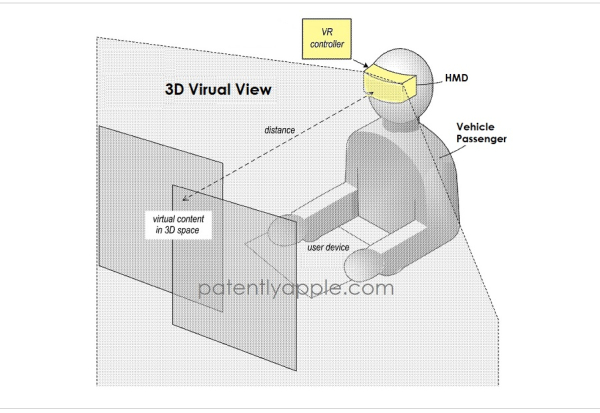
Source: www.patentlyapple.com
(Click on the image to enlarge)
Today, the US Patent and Trademark Office officially granted Apple a patent related to a virtual reality system for vehicles that can implement methods that address problems with moving vehicles that can cause motion sickness to passengers. The VR system is designed to be used in self-driving vehicles that do not have windows, with the user’s VR headset giving them a view of the road they are on, if they so choose. The vehicle’s virtual reality system will allow users, such as business executives, to conduct virtual meetings while commuting to work. Other experiences could include sophisticated virtual reality gaming on the go, reading a book, or chatting with family as if they were in the car with you.
Apple further describes that passengers can choose to have relaxing virtual experiences and have the user visualize themselves riding a boat floating down a river or flying over the landscape on a hang glider, or exciting virtual experiences such as a car chase or driving through a post-apocalyptic wasteland with zombies attacking, or anything in between.
Passengers will be able to choose to have the virtual experience of traveling through another real place, such as the streets of London, or through fictional cities or landscapes.
Virtual experiences can be educational and interactive, for example allowing the passenger to discover history or other information about landmarks in a virtual view of a city they are experiencing. Virtual experiences can be interactive in other ways, for example allowing a passenger to pass other vehicles during a racing experience or running over zombies in a post-apocalyptic landscape.
As another example, if the vehicle stops at a red light or for some other reason when fleeing from zombies in a post-apocalyptic landscape, the virtual experience can make the vehicle appear to stop and not allow it to restart until the light comes on. . green to build suspense.
Although not shown, in some embodiments, a virtual reality projection device 720 and/or virtual reality controller 710 may include one or more microphones for receiving voice input from passengers; for example, an HMD may include a microphone to receive voice input from a passenger using the device. Voice input can, for example, be used for voice control of the VR system, or to communicate with other passengers using HMDs, or for external communications such as phone calls and teleconferences via the VR controller or vehicle systems.
Additionally, in some embodiments, a VR projection device and/or VR controller may include or be coupled to internal cameras or other sensors to detect passenger movements or gestures, for example, hand, arm, or head gestures. head, eye movements, facial expressions, etc. In some embodiments, the detected gestures, movements, or expressions may be used as input to the virtual reality system to affect the rendering and/or display of virtual content to respective passengers.
In some embodiments, the detected gestures, movements, or expressions may be used as input to the virtual reality system to generate animated avatars of the respective passengers in the virtual content. Additionally, in some embodiments, a VR projection device 720 may include one or more external cameras, depth cameras, or other sensors that may be used as input to the VR system to affect the rendering and/or display of virtual content to respective passengers.
Apple Patent FIG. 1 below illustrates a virtual reality (VR) system that includes a head-mounted device (HMD) that can be used by passengers in vehiclesaccording to some embodiments.
(Click on the image to enlarge)
Apple Patent FIG. 2 below illustrates a virtual reality system that projects virtual reality content onto a vehicle window for passengers to view.
(Click on the image to enlarge)
Apple Patent FIG. 18 below illustrates a VR system that monitors a passenger using a VR system in a vehicle.
(Click on the image to enlarge)
Apple Patent FIG. 8 below is a block diagram illustrating active systems in a vehicle that can be used in a VR system to provide synchronized physical effects for passengers.
(Click on the image to enlarge)
In the Apple patent FIG. 9A below, we see that a busy executive traveling in his autonomous vehicle will not have to waste time and will be able to attend virtual meetings. In Fig. 9B we see that the caller of the virtual meeting can hold it beyond the office conference room, such as the back of a moving flatbed truck or elsewhere such as on a boat sailing down the river, as seen in FIG. 10 A. Virtual experiences could include feeling the wind on your face if you are traveling fast in a boat or feeling the fire if you are by a fireplace.
In patent FIG. 10C above, Apple shows that the user of the VR headset in the vehicle could decide to play games and one of them would be the use of their car running over AR/VR zombies. That’s a bit wacky, but it’s on patent, folks.
As shown in fig. 11 below, virtual views of real or fictional people can be integrated into the virtual experience provided by the VR system. For example, a virtual representation #1195 of an author or talk show host may appear to be sitting in the seat next to passenger #1190; the virtual author may be reading one of his books to the passenger, or the virtual talk show host may present his show from the seat next to the passenger, with their voices provided through the vehicle’s audio system or the HMD# 1100.
(Click on the image to enlarge)
For more details on this long-term Apple project, see Apple-issued patent 11,321,923. Apple applied for this patent in 2017.
Read More at www.patentlyapple.com